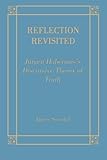Reflection Revisited : Jurgen Habermas' Discursive Theory of Truth / James C. Swindal.
Material type: TextSeries: Perspectives in Continental PhilosophyPublisher: New York, NY : Fordham University Press, [2021]Copyright date: ©1999Description: 1 online resource (298 p.)Content type:
TextSeries: Perspectives in Continental PhilosophyPublisher: New York, NY : Fordham University Press, [2021]Copyright date: ©1999Description: 1 online resource (298 p.)Content type: - 9780823218073
- 9780823296477
- 121/.092
- online - DeGruyter
| Item type | Current library | Call number | URL | Status | Notes | Barcode | |
|---|---|---|---|---|---|---|---|
 eBook
eBook
|
Biblioteca "Angelicum" Pont. Univ. S.Tommaso d'Aquino Nuvola online | online - DeGruyter (Browse shelf(Opens below)) | Online access | Not for loan (Accesso limitato) | Accesso per gli utenti autorizzati / Access for authorized users | (dgr)9780823296477 |
Browsing Biblioteca "Angelicum" Pont. Univ. S.Tommaso d'Aquino shelves, Shelving location: Nuvola online Close shelf browser (Hides shelf browser)

|

|

|

|

|

|

|
||
| online - DeGruyter Re: Joyce 'n Beckett / | online - DeGruyter Readings in Epistemology : From Aquinas, Bacon, Galileo, Descartes, Locke, Hume, Kant. / | online - DeGruyter Reason, Experience, and God : John E. Smith in Dialogue / | online - DeGruyter Reflection Revisited : Jurgen Habermas' Discursive Theory of Truth / | online - DeGruyter Reinterpreting Rahner : A Critical Study of His Major Themes / | online - DeGruyter Religious Orders of the Catholic Reformation / | online - DeGruyter Representative Practices : Peirce, Pragmatism, and Feminist Epistemology / |
Frontmatter -- Contents -- Abbreviations -- Acknowledgments -- Introduction: Reflection and Validity -- 1. Habermas's Critique of the Use of Reflection in Theories of Consciousness -- 2. The Early Habermas and the Development of Psychoanalytic Reflection and Normative Discourse -- 3. Habermas's Development of a Reflective Acceptability Theory of Truth -- 4. Reflective Acceptability in Discourse Ethics and Ego- Identity Development -- 5. The Temporal Background Conditions of Discourse -- Bibliography -- Index
restricted access online access with authorization star
http://purl.org/coar/access_right/c_16ec
Jurgen Habermas, particularly in his master work Theory of Communicative Action (1981), takes us several of the basic insights of the philosophical tradition of reflection initiated by Kant, and sets it on a new and highly original emancipative path. He claims that reflection not only can determine the limits of reasoning about thought and action, but also can grasp the limits that human agents face in freeing themselves form unjust social and economic structures. Human agents can engage in constructive and emancipative communication with others by determining the limits not of their own consciousness, but of the intersubjective structures shared in everyday communication. Reflection Revisited examines Habermas’ own two-stage development of this theory of emancipative reflection and explicates how he applies reflection specifically to the problems of personal identity development and ethics.
Mode of access: Internet via World Wide Web.
In English.
Description based on online resource; title from PDF title page (publisher's Web site, viewed 03. Jan 2023)


